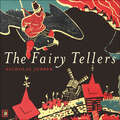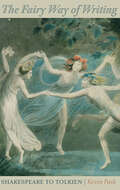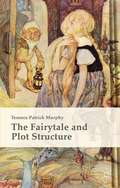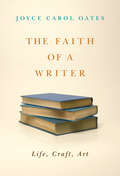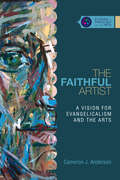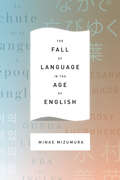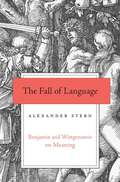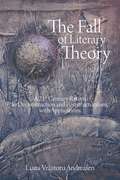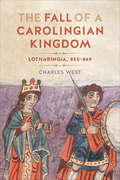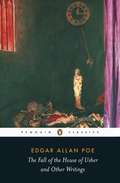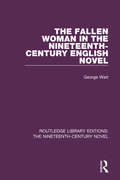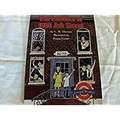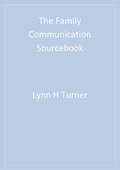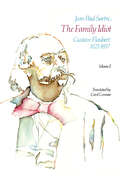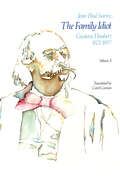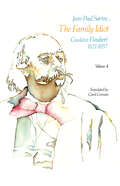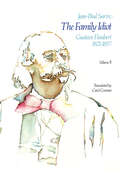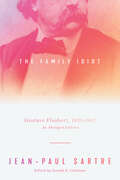- Table View
- List View
The Fairy Tellers: A Journey into the Secret History of Fairy Tales
by Nicholas JubberThe surprising origins and people behind the world's most influential magical tales: the people who told and re-shaped them, the landscapes that forged them, and the cultures that formed them and were in turn formed by them.Fairy-Tales are not just fairy-tales: they are records of historical phenomena, telling us something about how Western civilisation was formed. In The Fairy-Tellers' Trail, award-winning travel-writer Nick Jubber explores their secret history of fairy-tales: the people who told them, the landscapes that forged them, and the cultures that formed them. While there are certain names inextricably entwined with the concept of a fairy-tale, such as the Brothers Grimm and Hans Christian Andersen, the most significant tellers are long buried under the more celebrated figures who have taken the credit for their stories - people like the Syrian storyteller Youhenna Diab and the Wild Sisters of Cassel. Without them we would never have heard of Aladdin, his Magic Lamp or the adventures of Hansel and Gretel. Tracking these stories to their sources carries us through the steaming cities of Southern Italy and across the Mediterranean to the dust-clogged alleys of the Maghreb, under the fretting leaves of the Black Forest, deep into the tundra of Siberia and across the snowy hills of Lapland.From North Africa and Siberia, this audiobook illuminates the complicated relationship between Western civilisation and the 'Eastern' cultures it borrowed from, and the strange lives of our long lost fairy-tellers.(P) 2022 Hodder & Stoughton Limited
The Fairy Way of Writing: Shakespeare to Tolkien
by Kevin PaskA history of popular superstitions, tales, and magic in British literature. In The Fairy Way of Writing, Kevin Pask seeks to explain the origins and popularity of enchantment in Shakespeare’s plays. Writers John Dryden and Joseph Addison originated the phrase "fairy way of writing" to define the concept of an English creative imagination founded on a synthesis of high literary culture and the popular culture of tales and superstitions. Beginning with Chaucer, Johnson, Dryden, and Milton, Pask argues that the fairy way of writing not only sets the stage for the fairy tale, the Gothic novel, and children’s literature but also informs genres beyond the English canon, including painting, twentieth-century fantasy fiction, and French fairy tales. In addition to English writers and visual artists such as Pope, Blake, and Keats, who were directly engaged with Shakespearean fantasy, Pask also examines fairy tales, letters, and paintings by the French writers Madame d'Aulnoy, Charles Perrault, Madame de Sévigné, and the Swiss-born artist Johann Heinrich Füssli (Fuseli).The Fairy Way of Writing alters the traditional sense of English literary history and of Shakespeare’s singular place in it, insisting on the importance of often-overlooked literary and visual works. It recovers a distinctive aspect of English literary culture from across the entire early modern era and beyond, one that has been studied in the context of individual periods and writers but is only now explored in relation to the history of European nationalism and the creation of the modern literary system.
The Faith of a Writer: Life, Craft, Art
by Joyce Carol OatesA tribute to the brilliant craftsmanship of one of our most distinguished writers, providing valuable insight into her inspiration and her method Joyce Carol Oates is widely regarded as one of America's greatest contemporary literary figures. Having written in a number of genres -- prose, poetry, personal and critical essays, as well as plays -- she is an artist ideally suited to answer essential questions about what makes a story striking, a novel come alive, a writer an artist as well as a craftsman. In The Faith of a Writer, Oates discusses the subjects most important to the narrative craft, touching on topics such as inspiration, memory, self-criticism, and "the unique power of the unconscious." On a more personal note, she speaks of childhood inspirations, offers advice to young writers, and discusses the wildly varying states of mind of a writer at work. Oates also pays homage to those she calls her "significant predecessors" and discusses the importance of reading in the life of a writer. Oates claims, "Inspiration and energy and even genius are rarely enough to make 'art': for prose fiction is also a craft, and craft must be learned, whether by accident or design." In fourteen succinct chapters, The Faith of a Writer provides valuable lessons on how language, ideas, and experience are assembled to create art.
The Faithful Artist: A Vision for Evangelicalism and the Arts (Studies in Theology and the Arts #Coming In August)
by Cameron J. AndersonThe tension between Christianity and the arts is often real. But it also offers a false dichotomy. Many Christian artists think that they must choose between their faith and their artistic calling. Drawing upon his experiences as both a Christian and a practicing artist, Cameron J. Anderson explores the dynamics of faith and art in this latest volume in IVP Academic?s Studies in Theology and the Arts series. Tracing the relationship between evangelicalism and modern art in postwar America—two entities that often found themselves at odds with each other—Anderson raises several issues that confront artists. With skill, sensitivity and insight, he considers questions such as the role of our bodies and our senses in our experience of the arts, the relationship between text and image, the persistent dangers of idolatry, the possibility of pursuing God through an encounter with beauty and more. Throughout this study, Anderson's principal concern is how Christian artists can faithfully pursue their vocational calling in contemporary culture. Readers will find here not only an informed and thoughtful response, but also a vision that offers guidance and hope.
The Fall of Cities in the Mediterranean
by Dorota Dutsch Bachvarova, Mary R. and Dutsch, Dorota and Suter, Ann Mary R. Bachvarova Ann SuterA body of theory has developed about the role and function of memory in creating and maintaining cultural identity. Yet there has been no consideration of the rich Mediterranean and Near Eastern traditions of laments for fallen cities in commemorating or resolving communal trauma. This volume offers new insights into the trope of the fallen city in folk-song and a variety of literary genres. These commemorations reveal memories modified by diverse agendas, and contains narrative structures and motifs that show the meaning of memory-making about fallen cities. Opening a new avenue of research into the Mediterranean genre of city lament, this book examines references to, or re-workings of, otherwise lost texts or ways of commemorating fallen cities in the extant texts, and with greater emphasis than usual on the point of view of the victors.
The Fall of Language in the Age of English
by Juliet Winters Carpenter Minae Mizumura translated by Mari YoshiharaMinae Mizumura was born in Tokyo, moved to New York at the age of twelve, and studied French literature at Yale University. Acclaimed for her audacious experimentation and skillful storytelling, Mizumura has won major literary awards for all four of her novels--one of which, A True Novel, recently was published in English. She lives in Tokyo.
The Fall of Language in the Age of English
by Juliet Winters Carpenter Mari Yoshihara Minae MizumuraMinae Mizumura was born in Tokyo, moved to New York at the age of twelve, and studied French literature at Yale University. Acclaimed for her audacious experimentation and skillful storytelling, Mizumura has won major literary awards for all four of her novels--one of which, A True Novel, recently was published in English. She lives in Tokyo.
The Fall of Language in the Age of English
by Juliet Winters Carpenter Mari Yoshihara Minae MizumuraMinae Mizumura was born in Tokyo, moved to New York at the age of twelve, and studied French literature at Yale University. Acclaimed for her audacious experimentation and skillful storytelling, Mizumura has won major literary awards for all four of her novels--one of which, A True Novel, recently was published in English. She lives in Tokyo.
The Fall of Language in the Age of English
by Minae MizumuraWinner of the Kobayashi Hideo Award, The Fall of Language in the Age of English lays bare the struggle to retain the brilliance of one's own language in this period of English-language dominance. Born in Tokyo but raised and educated in the United States, Minae Mizumura acknowledges the value of a universal language in the pursuit of knowledge yet also embraces the different ways of understanding offered by multiple tongues. She warns against losing this precious diversity.Universal languages have always played a pivotal role in advancing human societies, Mizumura shows, but in the globalized world of the Internet, English is fast becoming the sole common language of humanity. The process is unstoppable, and striving for total language equality is delusional—and yet, particular kinds of knowledge can be gained only through writings in specific languages.Mizumura calls these writings "texts" and their ultimate form "literature." Only through literature and, more fundamentally, through the diverse languages that give birth to a variety of literatures, can we nurture and enrich humanity. Incorporating her own experiences as a writer and a lover of language and embedding a parallel history of Japanese, Mizumura offers an intimate look at the phenomena of individual and national expression.
The Fall of Language: Benjamin and Wittgenstein on Meaning
by Alexander SternKnown for his essays on culture, aesthetics, and literature, Walter Benjamin also wrote on the philosophy of language. For Alexander Stern, his famously obscure—and, for some, hopelessly mystical—early work contains important insights, anticipating and in some respects surpassing Wittgenstein’s later thinking on the philosophy of language.
The Fall of Literary Theory: A 21st Century Return to Deconstruction and Poststructuralism, with Applications
by Liana AndreasenThe book revives literary theory, which was popular at the end of the 20th century, with the purpose of showing how useful it is in the current century in opening the minds of students to the dangers of claiming to have a fixed identity. The book shows that in Western cultures identity is a construct that always sees individuals as lacking something (being fallen) that can be retrieved or gained at the expense of an Other, an adversary seen as standing in the way of identity fulfillment. The book shows the history of "fallenness" through an analysis of Melville's Billy Budd, Faulkner's Absalom, Absalom!, Pynchon's The Crying of Lot 49. It also shows ways to heal identity through an analysis of Toni Morrison's Beloved and Rudolfo Anaya's Tortuga.
The Fall of a Carolingian Kingdom: Lotharingia 855–869
by Charles WestThe Fall of a Carolingian Kingdom investigates how the first royal divorce scandal led to the collapse of a kingdom, changing the fate of medieval Europe. Through a set of annotated translations of key contemporary sources, the book presents the downfall of the Frankish kingdom of Lotharingia as a case study in early medieval politics, equipping readers to develop their own independent interpretations. The book tracks the twists and turns of the scandal as it unfolded over a crucial decade and a half in the ninth century. Drawing on primary sources such as letters, material culture, and secret treaties, The Fall of a Carolingian Kingdom offers readers a sharply defined window into one of the most dramatic episodes in Carolingian history, rich with insights on the workings of early medieval society.
The Fall of the House of Usher and Other Writings: Poems, Tales, Essays, And Reviews
by Edgar Allan PoeThe Fall of the House of Usher and Other Writings is a collection that displays the full force of Edgar Allen Poe's mastery of both Gothic horror and the short story form. This Penguin Classics edition is edited with an introduction and notes by David Galloway.This selection of Poe's critical writings, short fiction and poetry demonstrates his intense interest in aesthetic issues, and the astonishing power and imagination with which he probed the darkest corners of the human mind. 'The Fall of the House of Usher' is a slow-burning Gothic horror, describing the final hours of a family tormented by tragedy and the legacy of the past. In 'The Tell-Tale Heart', a murderer's insane delusions threaten to betray him, while stories such as 'The Pit and the Pendulum', 'The Raven' and 'The Cask of Amontillado' explore extreme states of decadence, fear and hate. In his introduction David Galloway re-examines the myths surrounding Poe's life and reputation. This edition includes a new chronology and suggestions for further reading.Although dissipated in his youth and plagued by mental instability towards the end of his life, Boston-born Edgar Allan Poe (1809-49) had a variety of occupations, including service in the US army and magazine editor, as well as his remarkable literary output.If you enjoyed The Fall of the House of Usher, you might like Horace Walpole's The Castle of Otranto, also available in Penguin Classics.'The most original genius that America has produced'Alfred, Lord Tennyson'Poe has entered our popular consciousness as no other American writer'The New York Times Book Review
The Fallen Woman in the Nineteenth-Century English Novel (Routledge Library Editions: The Nineteenth-Century Novel #39)
by George WattA sympathetic view of the fallen women in Victorian England begins in the novel. First published in 1984, this book shows that the fallen woman in the nineteenth-century novel is, amongst other things, a direct response to the new society. Through the examination of Dickens, Gaskell, Collins, Moore, Trollope, Gissing and Hardy, it demonstrates that the fallen woman is the first in a long line of sympathetic creations which clash with many prevailing social attitudes, and especially with the supposedly accepted dichotomy of the ‘two women’. This book will be of interest to students of nineteenth-century literature and women in literature.
The Family Communication Sourcebook
by Richard L. West Lynn H TurnerThe Family Communication Sourcebook provides an in-depth examination of contemporary theory and research in the area of family communication. This unique collection offers a state-of-the art approach by pairing conceptual pieces with original studies in the same general topic area. Editors Lynn H. Turner and Richard West present readers with a thoughtful and thorough exploration of the critical issues facing family communication researchers today.
The Family Idiot: Gustave Flaubert, 1821-1857, Volume 2 (The Family Idiot #2)
by Jean-Paul SartreSeen by many as the culmination of Sartre's thought and project, and viewed by Sartre himself as an attempt to answer the question, "What, at this point in time, can we know about a man?" this monumental work continues to perplex its fascinated critics and admirers, who have argued about its precise nature. However, as reviews of the first volume in this translation agreed, whatever The Family Idiot may be called—"a dialectic" (Fredric Jameson, New York Times Book Review); "biography, philosophy, or politics? Surely . . . all of these together" (Renee Winegarten, Commentary); "a new form of fiction?" (Victor Brombert, Times Literary Supplement); or simply, "mad, of course" (Julian Barnes, London Review of Books)—its prominent place in intellectual history is indisputable. Volume 2, consisting of the first book of part 2 of the original French work, takes the reader through Flaubert's adolescence well into his evolution as an artist. Sartre's approach to his complex subject, whether jaunty or ponderous, psychoanalytical or political, is captured in all of its rich variety of Carol Cosman's translation.
The Family Idiot: Gustave Flaubert, 1821-1857, Volume 2 (The Family Idiot #2)
by Jean-Paul SartreSeen by many as the culmination of Sartre's thought and project, and viewed by Sartre himself as an attempt to answer the question, "What, at this point in time, can we know about a man?" this monumental work continues to perplex its fascinated critics and admirers, who have argued about its precise nature. However, as reviews of the first volume in this translation agreed, whatever The Family Idiot may be called—"a dialectic" (Fredric Jameson, New York Times Book Review); "biography, philosophy, or politics? Surely . . . all of these together" (Renee Winegarten, Commentary); "a new form of fiction?" (Victor Brombert, Times Literary Supplement); or simply, "mad, of course" (Julian Barnes, London Review of Books)—its prominent place in intellectual history is indisputable. Volume 2, consisting of the first book of part 2 of the original French work, takes the reader through Flaubert's adolescence well into his evolution as an artist. Sartre's approach to his complex subject, whether jaunty or ponderous, psychoanalytical or political, is captured in all of its rich variety of Carol Cosman's translation.
The Family Idiot: Gustave Flaubert, 1821-1857, Volume 3 (The Family Idiot #3)
by Jean-Paul SartreSeen by many as the culmination of Sartre's thought and project, and viewed by Sartre himself as an attempt to answer the question, "What, at this point in time, can we know about a man?" this monumental work continues to perplex its fascinated critics and admirers, who have argued about its precise nature. However, as reviews of the first volume in this translation agreed, whatever The Family Idiot may be called—"a dialectic" (Fredric Jameson, New York Times Book Review); "biography, philosophy, or politics? Surely . . . all of these together" (Renee Winegarten, Commentary); "a new form of fiction?" (Victor Brombert, Times Literary Supplement); or simply, "mad, of course" (Julian Barnes, London Review of Books)—its prominent place in intellectual history is indisputable. Volume 3 consists of "School Years" and "Preneurosis," which are the second and third books of part 2 of the original French work. In vivid detail, Sartre renders Flaubert's secondary-school experiences and relationships: his part in a student rebellion against the faculty, his teenage infatuation with Romantic literature, his friendships and rivalries with his classmates, and the ironies inherent in the schoolboys' bourgeois existence. Sartre then discusses Flaubert's years at law school, where he studied at his father's insistence. This volume also contains Sartre's most sustained analysis of Madame Bovary. Sartre's approach to his complex subject, whether jaunty or judicious, psychoanalytical or political, is captured in all of its rich variety in Carol Cosman's translation.
The Family Idiot: Gustave Flaubert, 1821-1857, Volume 4 (The Family Idiot #4)
by Jean-Paul SartreSeen by many as the culmination of Sartre's thought and project, and viewed by Sartre himself as an attempt to answer the question, "What, at this point in time, can we know about a man?" this monumental work continues to perplex its fascinated critics and admirers, who have argued about its precise nature. However, as reviews of the first volume in this translation agreed, whatever The Family Idiot may be called—"a dialectic" (Fredric Jameson, New York Times Book Review); "biography, philosophy, or politics? Surely . . . all of these together" (Renee Winegarten, Commentary); "a new form of fiction?" (Victor Brombert, Times Literary Supplement); or simply, "mad, of course" (Julian Barnes, London Review of Books)—its prominent place in intellectual history is indisputable. Volume 4 consists of part three, books one and two, of the original French work. This volume, the fourth in a projected five-volume English-language edition, includes Sartre's discussion of the onset of Flaubert's illness, or neurosis, in 1844, and a significant reading of his L'Education sentimentale. Sartre's approach to his complex subject, whether jaunty or judicious, psychoanalytic or political, is captured in all of its rich variety in Carol Cosman's translation.
The Family Idiot: Gustave Flaubert, 1821-1857, Volume 4 (The Family Idiot #4)
by Jean-Paul SartreSeen by many as the culmination of Sartre's thought and project, and viewed by Sartre himself as an attempt to answer the question, "What, at this point in time, can we know about a man?" this monumental work continues to perplex its fascinated critics and admirers, who have argued about its precise nature. However, as reviews of the first volume in this translation agreed, whatever The Family Idiot may be called—"a dialectic" (Fredric Jameson, New York Times Book Review); "biography, philosophy, or politics? Surely . . . all of these together" (Renee Winegarten, Commentary); "a new form of fiction?" (Victor Brombert, Times Literary Supplement); or simply, "mad, of course" (Julian Barnes, London Review of Books)—its prominent place in intellectual history is indisputable. Volume 4 consists of part three, books one and two, of the original French work. This volume, the fourth in a projected five-volume English-language edition, includes Sartre's discussion of the onset of Flaubert's illness, or neurosis, in 1844, and a significant reading of his L'Education sentimentale. Sartre's approach to his complex subject, whether jaunty or judicious, psychoanalytic or political, is captured in all of its rich variety in Carol Cosman's translation.
The Family Idiot: Gustave Flaubert, 1821-1857, Volume 5 (The Family Idiot #5)
by Jean-Paul SartreWith this volume, the University of Chicago Press completes its translation of a work that is indispensable not only to serious readers of Flaubert but to anyone interested in the last major contribution by one of the twentieth century's greatest thinkers. That Sartre's study of Flaubert, The Family Idiot, is a towering achievement in intellectual history has never been disputed. Yet critics have argued about the precise nature of this novel or biography or "criticism-fiction" which is the summation of Sartre's philosophical, social, and literary thought. In the preface, Sartre writes: "The Family Idiot is the sequel to Search for a Method. The subject: what, at this point in time, can we know about a man? It seemed to me that this question could only be answered by studying a specific case." Sartre discusses Flaubert's personal development, his relationship to his family, his decision to become a writer, and the psychosomatic crisis or "conversion" from his father's domination to the freedom of his art. Sartre blends psychoanalysis with a sociological study of the ideology of the period, the crisis in literature, and Flaubert's influence on the future of literature. While Sartre never wrote the final volume he envisioned for this vast project, the existing volumes constitute in themselves a unified work—one that John Sturrock, writing in the Observer, called "a shatteringly fertile, digressive and ruthless interpretation of these few cardinal years in Flaubert's life." "A virtuoso perfomance. . . . For all that this book does to make one reconsider his life, The Family Idiot is less a case study of Flaubert than it is a final installment of Sartre's mythology. . . . The translator, Carol Cosman, has acquitted herself brilliantly."—Frederick Brown, New York Review of Books "A splendid translation by Carol Cosman. . . . Sartre called The Family Idiot a 'true novel,' and it does tell a story and eventually reach a shattering climax. The work can be described most simply as a dialectic, which shifts between two seemingly alternative interpretations of Flaubert's destiny: a psychoanalytic one, centered on his family and on his childhood, and a Marxist one, whose guiding themes are the status of the artist in Flaubert's period and the historical and ideological contradictions faced by his social class, the bourgeoisie."—Fredric Jameson, New York Times Book Review Jean-Paul Sartre (1906-1980) was offered, but declined, the Nobel Prize for literature in 1964. His many works of fiction, drama, and philosophy include the monumental study of Flaubert, The Family Idiot, and The Freud Scenario, both published in translation by the University of Chicago Press.
The Family Idiot: Gustave Flaubert, 1821-1857, Volume 5 (The Family Idiot #5)
by Jean-Paul SartreWith this volume, the University of Chicago Press completes its translation of a work that is indispensable not only to serious readers of Flaubert but to anyone interested in the last major contribution by one of the twentieth century's greatest thinkers. That Sartre's study of Flaubert, The Family Idiot, is a towering achievement in intellectual history has never been disputed. Yet critics have argued about the precise nature of this novel or biography or "criticism-fiction" which is the summation of Sartre's philosophical, social, and literary thought. In the preface, Sartre writes: "The Family Idiot is the sequel to Search for a Method. The subject: what, at this point in time, can we know about a man? It seemed to me that this question could only be answered by studying a specific case." Sartre discusses Flaubert's personal development, his relationship to his family, his decision to become a writer, and the psychosomatic crisis or "conversion" from his father's domination to the freedom of his art. Sartre blends psychoanalysis with a sociological study of the ideology of the period, the crisis in literature, and Flaubert's influence on the future of literature. While Sartre never wrote the final volume he envisioned for this vast project, the existing volumes constitute in themselves a unified work—one that John Sturrock, writing in the Observer, called "a shatteringly fertile, digressive and ruthless interpretation of these few cardinal years in Flaubert's life." "A virtuoso perfomance. . . . For all that this book does to make one reconsider his life, The Family Idiot is less a case study of Flaubert than it is a final installment of Sartre's mythology. . . . The translator, Carol Cosman, has acquitted herself brilliantly."—Frederick Brown, New York Review of Books "A splendid translation by Carol Cosman. . . . Sartre called The Family Idiot a 'true novel,' and it does tell a story and eventually reach a shattering climax. The work can be described most simply as a dialectic, which shifts between two seemingly alternative interpretations of Flaubert's destiny: a psychoanalytic one, centered on his family and on his childhood, and a Marxist one, whose guiding themes are the status of the artist in Flaubert's period and the historical and ideological contradictions faced by his social class, the bourgeoisie."—Fredric Jameson, New York Times Book Review Jean-Paul Sartre (1906-1980) was offered, but declined, the Nobel Prize for literature in 1964. His many works of fiction, drama, and philosophy include the monumental study of Flaubert, The Family Idiot, and The Freud Scenario, both published in translation by the University of Chicago Press.
The Family Idiot: Gustave Flaubert, 1821–1857, An Abridged Edition
by Jean-Paul SartreAn approachable abridgment of Sartre’s important analysis of Flaubert. From 1981 to 1994, the University of Chicago Press published a five-volume translation of Jean-Paul Sartre’s The Family Idiot: Gustave Flaubert, 1821-1857, a sprawling masterwork by one of the greatest intellects of the twentieth century. This new volume delivers a compact abridgment of the original by renowned Sartre scholar, Joseph Catalano. Sartre claimed that his existential approach to psychoanalysis required a new Freud, and in his study of Gustave Flaubert, Sartre becomes that Freud. The work summarizes Sartre’s overarching aim to reveal that human life is a meaningful adventure of freedom. In discussing Flaubert’s work, particularly his classic novel Madame Bovary, Sartre unleashes a fierce critique of modernity as nihilistic and demeaning of human dignity.
